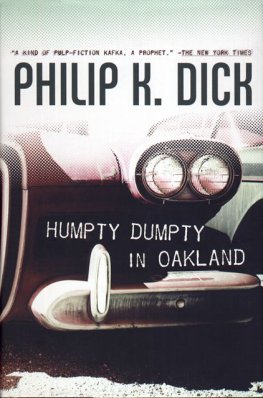Philip Dick - THE MAN WHO JAPED
Here you can read online Philip Dick - THE MAN WHO JAPED full text of the book (entire story) in english for free. Download pdf and epub, get meaning, cover and reviews about this ebook. genre: Science fiction. Description of the work, (preface) as well as reviews are available. Best literature library LitArk.com created for fans of good reading and offers a wide selection of genres:
Romance novel
Science fiction
Adventure
Detective
Science
History
Home and family
Prose
Art
Politics
Computer
Non-fiction
Religion
Business
Children
Humor
Choose a favorite category and find really read worthwhile books. Enjoy immersion in the world of imagination, feel the emotions of the characters or learn something new for yourself, make an fascinating discovery.
- Book:THE MAN WHO JAPED
- Author:
- Genre:
- Rating:4 / 5
- Favourites:Add to favourites
- Your mark:
- 80
- 1
- 2
- 3
- 4
- 5
THE MAN WHO JAPED: summary, description and annotation
We offer to read an annotation, description, summary or preface (depends on what the author of the book "THE MAN WHO JAPED" wrote himself). If you haven't found the necessary information about the book — write in the comments, we will try to find it.
THE MAN WHO JAPED — read online for free the complete book (whole text) full work
Below is the text of the book, divided by pages. System saving the place of the last page read, allows you to conveniently read the book "THE MAN WHO JAPED" online for free, without having to search again every time where you left off. Put a bookmark, and you can go to the page where you finished reading at any time.
Font size:
Interval:
Bookmark:
Philip K. Dick
THE MAN WHO JAPED
CHAPTER 1
At seven a.m., Allen Purcell, the forward-looking young president of the newest and most creative of the Research Agencies, lost a bedroom. But he gained a kitchen. The process was automatic, controlled by an iron-oxide-impregnated tape sealed in the wall. Allen had no authority over it, but the transfiguration was agreeable to him; he was already awake and ready to rise.
Squinting and yawning and now on his feet, he fumbled for the manual knob that released the stove. As usual the stove was stuck half in the wall and half out into the room. But all that was needed was a firm push. Allen pushed, and, with a wheeze, the stove emerged.
He was king of his domain: this one-room apartment within sight of theblessedMorec spire. The apartment was hard won. It had been his heritage, deeded to him by his family; the lease had been defended for over forty years. Its thin plasterboard walls formed a box of priceless worth; it was an empty space valued beyond money.
The stove, properly unfolded, became also sink and table and food cupboard. Two chairs hinged out from its underside, and beneath the stored supplies were dishes. Most of the room was consumed, but sufficient space remained in which to dress.
His wife Janet, with difficulty, had gotten into her slip. Now, frowning, she held an armload of skirt and looked around her in bewilderment. The central heating had not penetrated to their apartment as yet, and Janet shivered.
In the cold autumn mornings she awoke with fright; she had been his wife three years but she had never adjusted to the shifts of the room.
"What's the matter?" he asked, shedding his pajamas. The air, to him, was invigorating; he took a deep breath.
"I'm going to reset the tape. Maybe for eleven." She resumed dressing, a slow process with much wasted motion.
"The oven door," he said, opening the oven for her. "Lay your things there, like always."
Nodding, she did so. The Agency had to be opened promptly at eight, which meant getting up early enough to make the half-hour walk along the clogged lanes. Even now sounds of activity filtered up from the ground level, and from other apartments. In the hall, scuffling footsteps were audible; the line was forming at the community bathroom.
"You go ahead," he said to Janet, wanting her dressed and ready for the day. As she started off, he added: "Don't forget your towel."
Obediently, she collected her satchel of cosmetics, her soap and toothbrush and towel and personal articles, and left. Neighbors assembled in the hall greeted her.
"Morning, Mrs. Purcell."
Janet's sleepy voice: "Morning Mrs. O'Neill." And then the door closed.
While his wife was gone, Allen shook two corto-thiamin capsules from the medicine well. Janet owned all sorts of pills and sprays; in her early teens she had picked up un-dulant fever, one of the plagues revived by the attempt to create natural farms on the colony planets. The corto-thiamin was for his hangover. Last night he had drunk three glasses of wine, and on an empty stomach.
Entering the Hokkaido area had been a calculated risk. He had worked late at the Agency, until ten o'clock. Tired, but still restless, he had locked up and then rolled out a small Agency ship, a one-man sliver used to deliver rush orders to T-M. In the ship he had scooted out of Newer York, flown aimlessly, and finally turned East to visit Gates and Sugermann. But he hadn't stayed long; by eleven he was on his way back. And it had been necessary. Research was involved.
His Agency was totally outclassed by the giant four that made up the industry. Allen Purcell, Inc. had no financial latitude and no backlog of ideas. Its packets were put together from day to day. His staffartists, historian, moral consultant, dictionist, dramatisttried to anticipate future trends rather than working from patterns that had been successful in the past. This was an advantage, as well as a defect. The big four were hidebound; they constructed a standard packet perfected over the years, basically the time-tested formula used by Major Streiter himself in the days before the revolution. Moral Reclamation, in those days, had consisted of wandering troops of actors and lecturers delivering messages, and the major had been a genius at media. The basic formula was, of course, adequate, but new blood was needed. The major himself had been new blood; originally a powerful figure in the Afrikaans Empirethe re-created Transvaal Statehe had revitalized the moral forces lying dormant in his own age.
"Your turn," Janet said, returning. "I left the soap and towel, so go right in." As he started from the room she bent to get out the breakfast dishes.
Breakfast took the usual eleven minutes. Allen ate with customary directness; the corto-thiamin had eliminated his queasiness. Across from him Janet pushed her half-finished food away and began combing her hair. The windowwith a touch of the switchdoubled as a mirror: another of the ingenious space-savers developed by the Committee's Housing Authority.
"You didn't get in until late," Janet said presently. "Last night, I mean." She glanced up. "Did you?"
Her question surprised him, because he had never known her to probe. Lost in the haze of her own uncertainties, Janet was incapable of venom. But, he realized, she was not probing. She was apprehensive. Probably she had lain awake wondering if he were all right, lain with her eyes open staring at the ceiling until eleven-forty, at which time he had made his appearance. As he had undressed, she had said nothing; she had kissed him as he slid in beside her, and then she had gone to sleep.
"Did you go to Hokkaido?" she wondered.
"For awhile. Sugermann gives me ideas... I find his talk stimulating. Remember the packet we did on Goethe? The business about lens-grinding? I never heard of that until Sugermann mentioned it. The optics angle made a good MorecGoethe saw his real job. Prisms before poetry."
"But" She gestured, a familiar nervous motion of her hands. "Sugermann's an egghead."
"Nobody saw me." He was reasonably certain of that; by ten o'clock Sunday night most people were in bed. Three glasses of wine with Sugermann, a half hour listening to Tom Gates play Chicago jazz on the phonograph, and that was all. He had done it a number of times before, and without untoward difficulty.
Bending down, he picked up the pair of oxfords he had worn. They were mud-spattered. And, across each, were great drops of dried red paint.
"That's from the art department," Janet said. She had, in the first year of the Agency, acted as his receptionist and file clerk, and she knew the office layout. "What were you doing with red paint?"
He didn't answer. He was still examining the shoes.
"And the mud," Janet said. "And look." Reaching down, she plucked a bit of grass dried to the sole of one shoe. "Where did you find grass at Hokkaido? Nothing grows in those ruins... it's contaminated, isn't it?"
"Yes," he admitted. It certainly was. The island had been saturated during the war, bombed and bathed and doctored and infested with every possible kind of toxic and lethal substance. Moral Reclamation was useless, let alone gross physical rebuilding. Hokkaido was as sterile and dead as it had been in 1972, the final year of the war.
"It's domestic grass," Janet said, feeling it. "I can tell." She had lived most of her life on colony planets. "The texture's smooth. It wasn't imported... it grows here on Earth."
With irritation he asked: "Where on Earth?"
"The Park," Janet said. "That's the only place grass grows. The rest is all apartments and offices. You must have been there last night."
Outside the window of the apartment theblessedMorec spire gleamed in the morning sun. Below it was the Park. The Park and spire comprised the hub of Morec, its
Font size:
Interval:
Bookmark:
Similar books «THE MAN WHO JAPED»
Look at similar books to THE MAN WHO JAPED. We have selected literature similar in name and meaning in the hope of providing readers with more options to find new, interesting, not yet read works.
Discussion, reviews of the book THE MAN WHO JAPED and just readers' own opinions. Leave your comments, write what you think about the work, its meaning or the main characters. Specify what exactly you liked and what you didn't like, and why you think so.

















